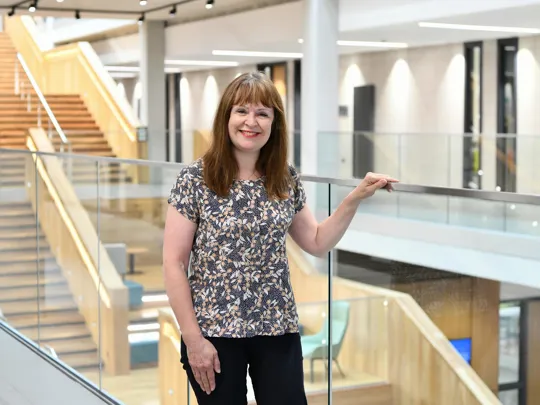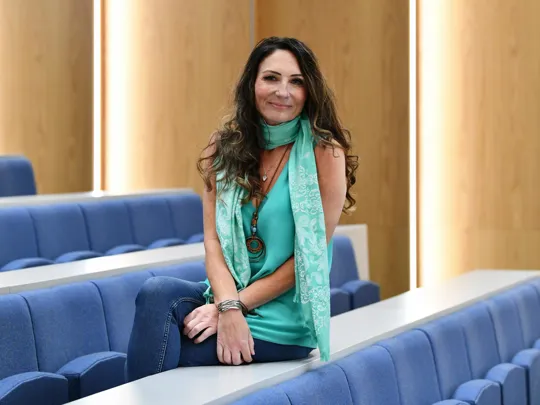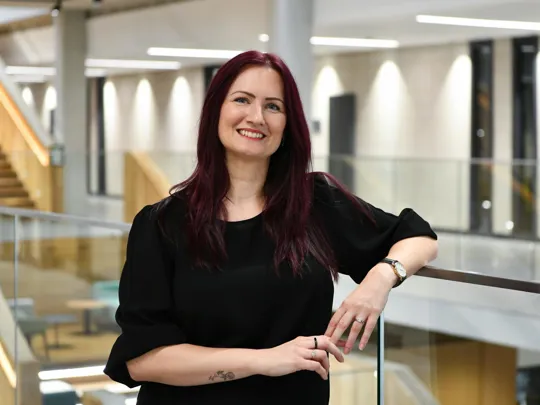Why should I choose this course?
- FLEXIBLE ONLINE LEARNING – Want to boost your knowledge while maintaining full-time/part-time employment? Studying our Childhood and Education Studies top-up degree online offers a flexible approach to learning
- SPECIALISE YOUR STUDIES – Study and research specialist topics through our range of optional modules, a final dissertation project and innovative assessment regimes
- DIVERSE SKILLS AND KNOWLEDGE – Build your understanding around childhood development and sociology as well as employability skills for your future career
- AWARD-WINNING UNIVERSITY – Study at the highest-ranking university in the region according to student choice (Whatuni Student Choice Awards 2023)
- NO EXAMS - If you are not keen on exams, this course is for you. Unlike many degrees in this field, you will have no written exams during or at the end of the course and will be assessed through coursework only
Course breakdown
- Modules
Core Modules
Contemporary Issues in Education, Learning & Graduate Practice (online)
Throughout this module, you will explore and discuss contemporary issues in education from many contrasting perspectives. By engaging in debates and exploring different assumptions and arguments, you will consider social, cultural and political factors that affect the education of children, the profession of educational practitioners, as well as the influence of parents and other key stakeholders. Through varying theoretical and philosophical frameworks, you will make connections between theory and practice in your own professional context. The topics studied will be relevant to your year of study in relation to contemporary issues within childhood education at that time.
Dissertation (online)
Engaging in individually selected and directed research is one of the highlights of an undergraduate degree and in this module you will be introduced to the skills and competences needed to explore your selected topic in depth to ensure you gain the most from this opportunity. Research at this level can be a daunting process but you will be appointed a dissertation tutor who will help guide you through this important and rewarding process.
Graduate Practice in a Simulated Learning Environment (online)
An online module focussing on virtually simulated placement that allows you to experience realistic industry-inspired scenarios and experiences that develop the knowledge, skills and behaviours needed for a graduate career in childhood and education. This bespoke virtual placement module provides an experiential learning approach to developing the ability to manage industry situations involving personal reflection to support professional development. The advantage of our simulated placement is that it allows you the unique experience to be exposed to challenging situations and experiences within a safe learning environment with the support of your peers and industry expert lecturer/s. Scenarios will include a variety of challenging situations, some of which you would not be guaranteed to experience through a standard live placement such as safeguarding disclosures, accidents in the classroom, managing conflict resulting in difficult discussions. You will experience a range of scenarios that will equip you with the competencies required to work in the education sector across a variety of age ranges and settings.
SEND in Childhood and Education (online)
This module invites you to critically reflect on issues in education that can be experienced as barriers to children's inclusion. As a key part of your study, you will acquire knowledge of different theoretical perspectives relevant to supporting the learning of children with Special Educational Needs and Disability (SEND) and appraise these within an educational context. Furthermore, you will develop an appreciation of your own position as educators and increased awareness of your strengths and areas for development when implementing an inclusive curriculum.
Developing Digital Literacies in Childhood and Education (online)
This module invites you to critically reflect on contemporary issues that have a significant impact on the development of learners' digital literacies and future employability roles. As a major part of the study, you will be developing knowledge about learner's digital cultures and the implications for pedagogical practice and the curriculum. You will understand how digital literacies can enrich learning experiences, the tools and learning techniques to empower learners to collaborate and solve problems, and the implications for policy and assessment reform. Furthermore, you will contemplate about the association between the commitment to social justice and access to digital literacy learning for learners and those who support their learning.
Entrepreneurism and Business (online)
This module will allow you to consider yourself as an entrepreneur within the Childhood and Education sector. As part of your study, you will reflect on and develop your own entrepreneurship skills as a practitioner and consider how these could implement your career choices and impact your practice. During your study, you will be given an introduction to entrepreneurship and critically analyse theoretical perspectives on entrepreneurship skills. You will also consider entrepreneurship Education as a pedagogical approach and how this may impact teaching and learning. You will be invited to explore the foundations of business and underpinning elements such as design and marketing skills, collaborative relationships, leadership, meeting necessary requirement etc. Overall, this module will provide essential transferable skills, applicable to your course and future career within Education.
Social Justice in Work with Families, Young People and Communities (online)
You will critically examine the historical and current roles played by professionals working with families, young people, and communities in relation to human rights, social justice and oppression. This will include the current and historical development of the legislative framework for anti- discriminatory practice. You will learn about key aspects of empowerment and development in practice. Ethical issues faced by workers in undertaking anti-oppressive/anti-discriminatory practice especially when working with marginalised individuals and groups with be reflected on. You will also explore the role of identity and culture in relation to development work and to working with diversity
PLEASE NOTE: The following modules offered in year three are optional modules (you can choose one):
- Developing Digital Literacies in Childhood and Education (online)
- Entrepreneurism and Business (online)
- Social Justice in Work with Families, Young People and Communities (online)
The modules listed above for this course are regularly reviewed to ensure they are up to date and informed by industry as well as the latest teaching methods. On occasion, we may need to make unexpected changes to modules – if this occurs, we will contact all offer holders as soon as possible.
Entry requirements
Academic: : A relevant HND or foundation degree in the areas of Early Years, Childcare or Advanced Practice with Children and Families, with 240 credits, plus GCSE/IGCSE English Language: Grades A*-C/9-4 or equivalent. If your previous HND or foundation degree subject is not related to Childhood and Education Studies, we will still consider applicants with significant work experience in the education sector. Please apply direct to receive an update on your suitability.
If you are unsure if your previous qualification is suitable, please contact us using our enquiry form before completing an application. Alternatively, you can call us on 0121 604 1040.
Key information
Teaching and assessment
Note: Indicative information only – actual timetables and assessment regimes will be issued at your induction.
Teaching
You will be expected to engage independently with asynchronous module online learning and teaching materials throughout the course. To support there will be online sessions including Skills for Success sessions and individual tutorials with an allocated personal tutor. For your final year dissertation, you will be supported through five meetings with your supervisor via web conferencing software.
All modules include:
- Online module content to access independently available via UCB’s virtual learning platform.
- Online discussion forums where you can collaborate with other students.
Assessment
Estimated breakdown of assessment for this degree course:
- Coursework – 100%
Assessments will employ a diverse range of technologies for which you will be offered pre-tutoring during your induction.
Our teaching and assessment is underpinned by our Learning and Teaching Strategy 2025-2030.
Tuition fees for home students
If you are a home student enrolling on an online course at University College Birmingham, the 2025/2026 tuition fee is £6,300 per year.
View tuition fees for home students
Please note that due to the online delivery of this course, it is classified as a distance learning course; therefore, you will not be eligible for a maintenance loan from the Student Loans Company.
It is funded via the part-time funding route, so when you apply for your tuition fee loan, please ensure you select 'part-time' as the mode of study, to ensure you are taken to the correct application form.
If you apply via the full-time application, you will not be able to find a course entitled Childhood Education Studies, and you must return to the start of the application process to amend the mode of study.

Without this online learning platform, I wouldn’t have continued with my studies and would’ve missed out on a future career in education and teaching. I would encourage anyone to take up this online degree to achieve their career goals and I’m grateful to the outstanding online education department for providing this opportunity.
Career opportunities
Note: Some roles below may require further study/training. The roles and salaries below are intended as a guide only.
Family support worker (graduate)
Average Salary: £35,000
Special educational needs coordinator (SENCO)
Average Salary: £30,172
Social worker (NHS)
Average Salary: £31,071
Learning mentor
Average Salary: £22,500
Primary school teacher
Average Salary: £29,364
Education administrator
Average Salary: £33,500

Viki’s Story
Viki’s decision to study online with University College Birmingham boosted her career while enabling her to spend quality time with her young family.
Meet your lecturers









